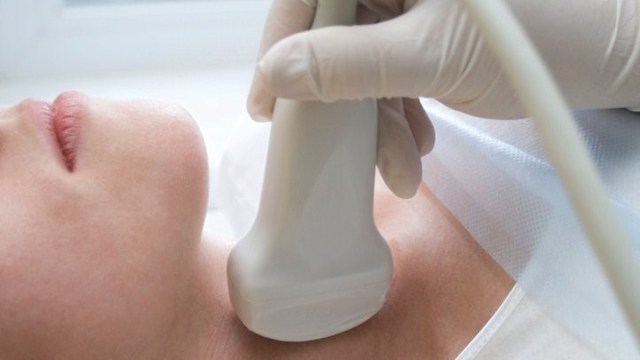A radioactive iodine uptake test is done to check how well the thyroid gland is functioning. You may be offered this test if you are having symptoms of thyroid disease.
The thyroid uses iodine to produce thyroid hormones, triiodothyronine (T3) and thyroxine (T4). By measuring how much iodine the thyroid gland takes up over a period of hours (anything between six and 24 hours) the doctors can see if it is functioning correctly.
Taking the Test
You won’t be allowed to eat for eight hours before the test and one or two hours following. You should inform your doctor of any medications you are taking as several medications, including corticosteroids, antihistamines, thyroid drugs, estrogen based drugs and lithium, can alter the results of the test.
These are only a few examples. Your doctor can advise you if your particular medication is okay to take while having the test.
If you are ill with diarrhea the test may have to be postponed because this can interfere with your absorption of iodine. You should also tell the doctor if you have an iodine deficiency (or too much iodine) or you have recently had an X-ray containing iodine contrast as this can also affect the results.
You will be given a capsule of radioactive iodine to swallow and told to come back to the clinic later to have a scan. The doctor will then place a probe over your neck and scan it. This takes around half an hour.
They will then be able to see how much of the iodine your thyroid has taken up. A normal result after six hours is anything from 3-16 percent and after 24 hours it is 8-25 percent, but this can vary according to the professionals analysing the results as some use a different way of measuring them.
Increased levels of absorption may mean you have goiter, Hashimoto’s thyroiditis or hyperthyroidism (overactive thyroid). Reduced levels of absorption may mean hypothyroidism (underactive thyroid).
Is it Safe?
This diagnostic test results in a low radiation exposure. Due to this it is not suitable for pregnant women or nursing mothers.
Allergic reactions may occur after the use of radiopharmaceuticals. People with an allergy to shellfish may also not be able to have this test.
After the Test
You will "shed" radioactive iodine through your urine so you should flush twice after using the toilet for 24-48 hours after the test is complete. Your doctor will advise you on any extra precautions you may need to take.
Sources:
Radioactive iodine uptake, Medline Plus. Web. 24 January 2012. http://www.nlm.nih.gov/medlineplus/ency/article/003689.htm
Radioactive iodine uptake, Drugs.com Web. 24 January 2012. http://www.drugs.com/enc/radioactive-iodine-uptake.html
Thyroid Scan and Uptake, Radiology Info. Web. 24 January 2012. http://www.radiologyinfo.org/en/info.cfm?pg=thyroiduptake
Joanna is a freelance health writer for The Mother magazine and Suite 101 with a column on infertility, http://infertility.suite101.com/. She is author of the book, 'Breast Milk: A Natural Immunisation,' and co-author of an educational resource on disabled parenting.
Reviewed January 24, 2012
by Michele Blacksberg RN
Edited by Jody Smith




Add a CommentComments
There are no comments yet. Be the first one and get the conversation started!